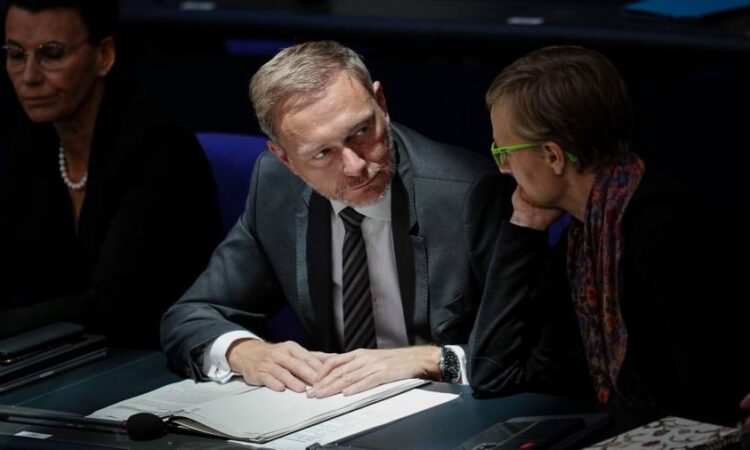
Germany’s finance minister has rejected common borrowing by the EU as a way to address the bloc’s energy crisis, saying it was cheaper for individual states to raise debt by themselves given the higher interest rates faced by the European Commission.
“The financial advantage the commission, and many member states once hoped for from common European debt, as opposed to issuing debt on a national basis, no longer exists,” Christian Lindner said in an interview.
His opposition to new rounds of borrowing will stoke tensions with other member states that feel Germany has done too little to forge a joint response to an energy crisis that threatens to drive the eurozone economy into a recession.
Berlin is already under fire for its unilateral €200bn relief programme aimed at easing energy costs for households and businesses. Earlier this month, Chancellor Olaf Scholz reluctantly agreed to a push for an EU-wide gas price cap, but subject to hefty caveats and preconditions.
The energy crisis has sparked fresh debate over the need for further joint borrowing after the unprecedented €800bn debt-raising programme that provided relief during the pandemic.
Ursula von der Leyen, commission president, has in recent days stressed the need to finance ambitious new cross-border energy infrastructure projects, as the EU attempts to accelerate its transition away from Russian gas and boost renewables.
The IMF has weighed in with a proposal last month for an EU “fiscal capacity” funded by common debt issuance and new income streams.
Yet northern EU countries remain sceptical, pointing out that the pandemic fund was always seen as a one-off. Lindner made clear his firm opposition. “We shouldn’t be raising the idea of more common borrowing by the EU at every opportunity, whenever we need more investment,” he said.
Brussels’ borrowing costs were among the eurozone’s lowest last year when it began issuing pandemic bonds. The EU sold a 10-year bond in June 2021 at a yield of 0.086 per cent, when French and Belgian 10-year debt was trading at yields of 0.171 per cent and 0.146 per cent respectively.
But EU borrowing costs have since risen above those of France or Belgium. EU 10-year debt now yields 2.89 per cent, compared with 2.63 per cent for France and 2.71 per cent for Belgium.
This has symbolic importance because, when the recovery fund launched, the fact that the commission’s borrowing costs were not only lower than the riskiest EU economies, such as Italy or Greece, but also the likes of France, was touted as a benefit. The borrowing costs of Italy, Spain and Portugal remain higher than those of the commission today.

The commission was recently forced to request a top-up to its 2023 budget plans given the rising cost of borrowing. It projected the need for an extra €450mn to cover the higher interest bill on EU borrowings next year, on top of a previously projected cost of €1.03bn for 2023.
Lindner said the EU would be issuing a “lot more debt” over the next few years for existing programmes, so “it wouldn’t make sense to test at what point the market is saturated”.
In addition, the minister took issue with planned commission proposals for reform of the EU’s fiscal rule book, known as the Stability and Growth Pact.
The commission has been working on an overhaul that would permit member states to agree multiyear, country-specific plans for getting their debt burdens under control in conjunction with the EU. The proposal, expected next month, would simplify the SGP regime and effectively give EU countries more leeway to design their own paths out of indebtedness — in return for stricter oversight by Brussels.
Lindner said: “It’s unwise to have individual arrangements on applying SGP rules which are negotiated on a bilateral basis.”
The pact’s credibility stemmed from the fact that “the rules have to be implemented by everybody, in the same way”, he added.
The minister said Germany was ready to accept “slower adjustment paths” for highly indebted countries as part of fiscal pact reforms, but there must still be a strong focus on “consistent, step-by-step deficit reductions”.
“In the current macroeconomic environment, with a high degree of uncertainty, there’s a real need to rebuild financial buffers and not fuel inflation further,” he said. “The macroeconomic environment has changed and we all have a responsibility to ensure the situation remains stable.”
Lindner leads the liberal FDP, a pro-business, fiscally hawkish party that governs Germany in an uneasy coalition with Scholz’s Social Democrats and the Greens.
The party has been hit by a string of recent electoral defeats, and this month suffered the humiliation of being booted from the parliament of the northern state of Lower Saxony.
Lindner acknowledged traditional FDP voters were unhappy with some of the Scholz government’s economic policies.
Some supported the idea of mobilising “massive economic aid in this crisis and deploy[ing] billions of euros to do that”. But others were dismayed at the levels of debt Germany was taking on “and the interest the state is having to pay on its debt is growing because of inflation”.
That was why he supported a return to Germany’s constitutional limit on new borrowing. This “debt brake” has been suspended since the pandemic and many on the left think it should be ditched completely.
“When your supporters are split, the only response . . . is to show leadership,” he said. “Part of that is insisting Germany must reinstate the debt brake next year. Otherwise, the dam would break and we would end up financing everything with emergency loans.”
Additional reporting by Tommy Stubbington in London






